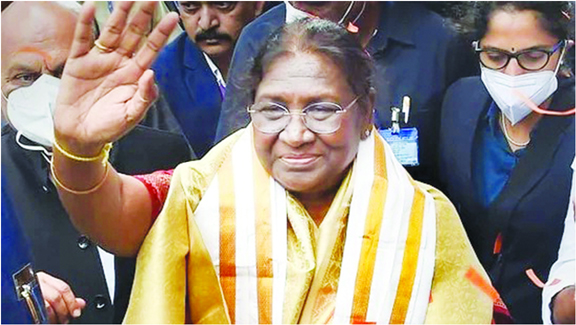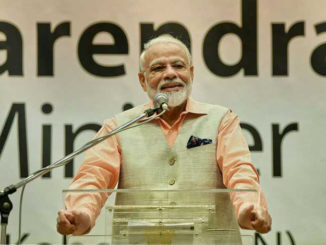
Former Governor of Jharkhand Draupadi Murmu scripted history to become India‘s first tribal President. Ruling NDA’s Draupadi Murmu and Opposition’s Yashwant Sinha were pitted against each other in the contest, and in an expected outcome, Murmu grabbed the hot seat. Murmu has come a long way to reach where she is today. India’s new President overcame several personal tragedies in her life. In just six years between 2009-2015, Murmu lost her husband, two sons, mother and brother. According to reports, it was then the tribal leader became a keen practitioner of the meditation techniques of the Brahma Kumaris, a movement she embraced after her personal losses. At 64, Murmu will be the youngest occupant of Rashtrapati Bhavan. She is younger by a month to the sixth President Neelam Sanjeeva Reddy who was 64 years and two months when he took office.
Murmu will also become only the second woman to hold the First Citizen’s office after Pratibha Patil.
However, Murmu is no stranger to being the first at something.
First to attend college
Murmu, 64, comes from a small village called Uperbeda, located some 20 kilometres away from Rairangpur in Mayurbhanj district of Odisha.
With her ascension, she becomes the first President to be born after independence; she was born on 20 June 1958.
She belongs to the Santhal tribe — the third largest scheduled tribe community in India after the Gonds and Bhils.
She spent her childhood in Uperbeda, which today boasts of a population of 6,623 people. She still has her ancestral home here. The house belonged to Draupadi’s father and is now inhabited by her nephew, Dularam Tudu.
It was from Uperbeda that she went to state capital Bhubaneshwar to college, making her the first from the village to attain higher education.
At the time, her parents could afford to give her only Rs 10 as a monthly allowance, reports NDTV.
Life of tragedy
What is very appealing about Droupadi Murmu is how she rose above the many challenges that were thrown at her and achieved success.
One can say her life is a story of resilience.
In 2009, her 25-year-old son Lakshman died unexpectedly after attending a gathering in Bhubaneshwar. His death broke her and many believed that she would not be able to cope with the loss. Supriya Kumari, head of the Brahma Kumari ashram in Rairangpaur told The Print, “She was completely shattered. She wasn’t having any life within her to even talk.”
However, she picked up the pieces of her life and started making changes, which included doing yoga and meditation. But, it was not meant to be and months later, she lost her younger son, Shipun, in a road accident. A year later, due to deep depression, her husband, Shyam Charan Murmu, died as well.
Today, Murmu has only her daughter, Itishree, with her.
She turned her personal tragedy into a positive by building a school in memory of her husband and sons — SLS Memorial School, named after her husband Shyam Charan and sons Lakshman and Shipun, in Pahadpur.
Born into a Santhal family,
Murmu is an excellent orator
Born on June 20, 1958, Murmu was the first woman governor of Jharkhand. Murmu is also the first president to be born after Independence. “She has been through a lot of pain and struggle, but doesn’t get rattled by adversity,” former Odisha BJP president Manmohan Samal said. Born into a Santhal family, she is an excellent orator in Santhali and Odia languages, Samal said. He added that she had worked extensively to improve infrastructure such as roads and ports in the region. The tribal-dominated Mayurbhanj has been the focus of the BJP, which is eyeing a strong foothold in the state. The BJD snapped ties with the BJP in 2009 and has consolidated its hold over Odisha since then.
First woman governor
Murmu rose through the political ranks and in 2000, she was the minister of state (independent charge) for Odisha’s department of transport and commerce.
She also assumed charge of the state’s animal husbandry department from 2002 to 2004, and the fisheries department in 2002.
In 2015, she was given the position of Governor of Jharkhand and made history by becoming the first female governor of a state. She remained in the post until 2021.
Officials and politicians recounting her tenure, describe her as a “compassionate and balanced” administrator who remained “accessible and down to earth”.
Officials add that she was “never a rubber-stamp governor”, and an ardent advocate of tribal welfare.
In fact, in 2017 she refused to give assent to a bill approved by the Assembly seeking amendments to the Chhotanagpur Tenancy Act, 1908, and the Santhal Pargana Tenancy Act, 1949.
Some political insiders maintain that Murmu’s decision to not sign the bill was the reason why she wasn’t picked as the NDA’s Presidential candidate in 2017 and Ram Nath Kovind was finally nominated by them.
Many believe that she will bring many fundamental changes in the running of the government in Rashtrapati Bhavan.




Be the first to comment